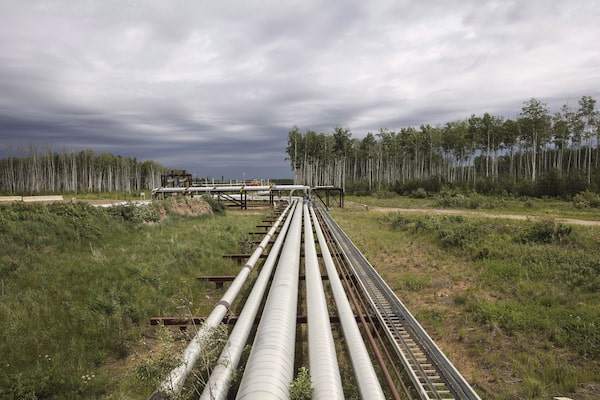
Suncor pipes that carry various liquids from their MacKay River pad in the oil sands in Fort McMurray Alta., 2017.JASON FRANSON/The Canadian Press
The pandemic exposed society’s vulnerabilities, some directly related to the virus and some not.
From quality of health care, to how those providing it are treated, to inequities among citizens dealing with COVID-19, to heightened concern about race relations and climate change – the focus on the issues has intensified, not least on public companies that have also been on a market rollercoaster.
Annual meeting season is approaching, and executives and directors will face questions and criticism from shareholders on how they are handling environmental, social and governance (ESG) issues that present tough-to-quantify risks to their bottom lines, and in turn to investor returns.
Some of those questions will come from institutional investors that are betting dollars specifically on improving performance in these areas, and are becoming more influential in global flows of capital.
“It’s not like no one’s ever talked about these issues before. These have been out there,” says Jamie Bonham, director of corporate engagement at NEI Investments, an asset manager that focuses on responsible investing. “But to date, anyway, they have never come together the way they did last year, and it really stimulated attention and momentum on these issues that I have not seen. I’ve been in the responsible investment space for 15 years, and nothing’s moved like that. It feels viscerally different.”
NEI Investments, which manages $9-billion of assets in its portfolios, is releasing on Thursday its annual list of 50 companies it will focus on for improving performance in key ESG criteria. It’s a process it has refined over the past two decades as a way to start conversations with management teams, put its proxy voting power to use, and press key issues with governments and regulators.
The firm, a unit of Toronto-based wealth manager Aviso Wealth, is part of a burgeoning field of investors pushing for improvements with these issues, and which have growing clout in financial markets.
Its focus list, which will evolve throughout the year, includes such international tech names as Apple Inc. , Facebook Inc. and Microsoft Corp. – which have come under scrutiny for online privacy concerns – and Canadian companies including Telus Corp. , Canadian National Railway , Suncor Energy Inc. and Enbridge Inc. The energy sector, unsurprisingly, is the focus of efforts to reduce CO2 emissions. Canada’s big banks and U.S. financial services giant JPMorgan Chase are also on the roster.
NEI Investments has highlighted three main themes of importance to various companies this year: human rights, addressing such areas as technology governance and Indigenous rights; inequality, dealing with equitable pay, diversity and inclusion; and the energy transition, targeting net-zero emission commitments, adherence to global climate reporting and disclosure standards as well as plastics manufacturing, use and recycling.
Most often, directors and managers are open to discussing the issues that are not strictly on the earnings statements, as they’ve grown in importance over the past decade, Mr. Bonham says. The firm initiates any talks with executives as an investor that wants to see companies succeed.
“They have answers. We may not agree on those answers. We may think the strategy is not right. We may disagree with the pace. But we no longer have a conversation about, ‘Does this matter?’ It’s implied now. The conversation is more about, ‘Are you doing it well enough?’ ” he says.
A major surprise over the past year has been the world’s increased focus on climate change, and efforts to combat it, when it seemed like the pandemic would consume all attention, Mr. Bonham says. However, the oil-price crash at the start of the lockdowns, which coincided with a market-share battle between Saudi Arabia and Russia, showed how fragile the economy is to outside forces. It also highlighted the need for resilience after years of debating the costs of a lower-carbon economy.
“The pace and the severity of how much life changed and so quickly, and the degree to which governments stepped in to make that change happen – I think it’s opened up the idea that it’s not unreasonable to think that rapid change could actually happen,” he says.
Jeffrey Jones writes about sustainable finance and the ESG sector for The Globe and Mail. Email him at jeff.jones@globeandmail.com.
Your time is valuable. Have the Top Business Headlines newsletter conveniently delivered to your inbox in the morning or evening. Sign up today.
 Jeffrey Jones
Jeffrey Jones